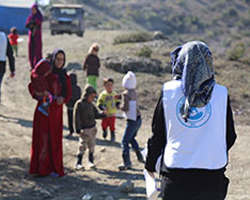WHO’s support to populations in northern Syria

SIG
Through the adoption of a series of resolutions, the United Nations (UN) Security Council has authorized UN agencies and their partners to deliver humanitarian assistance, including medical and surgical supplies, to people in need in Syria.
Based in the Turkish city of Gaziantep near the Syrian border, WHO has worked in the conflict zones of northern Syria as part of the UN’s whole-of-Syria outline to bring together and coordinate the health care groups providing life-saving interventions to people who may have no other source of health provision.
Not only have Syria’s health facilities been targeted on at least 350 verified occasions, more than 70 health staff have been killed since the start of the conflict in 2011. These wholly unacceptable attacks on health workers and infrastructure have made life still more difficult for civilians, including children and the elderly.
WHO’s work has saved numerous lives. With WHO’s technical guidance and support, health partners:
- deliver medicines and other supplies;
- vaccinate hundreds of thousands of Syrian children against polio, measles, diphtheria and other diseases;
- treat burns and severe injuries;
- provide primary health care to more than a million people;
- prepare for disease outbreaks; for example, cholera;
- care for patients with diabetes and other noncommunicable diseases;
- identify the signs of psychiatric trauma and refer patients for proper care;
- train health care workers.



